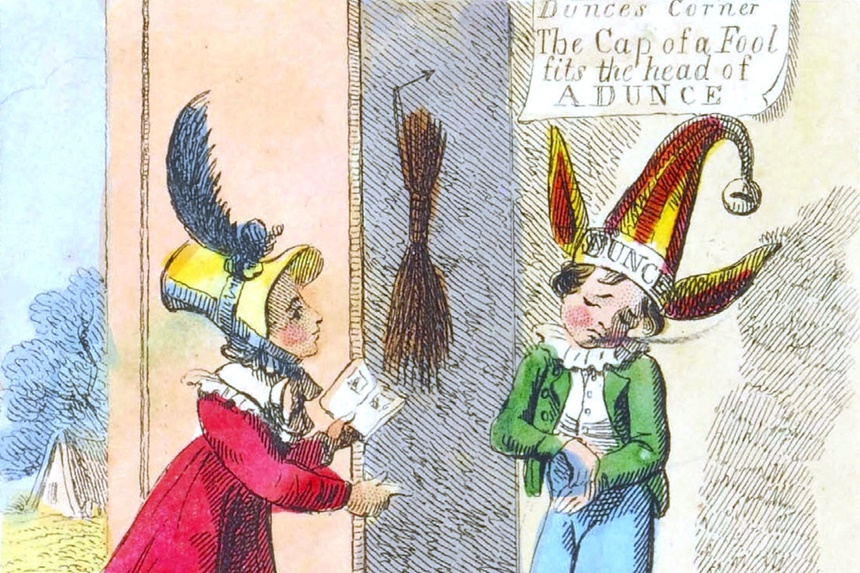Managing editor and logophile Andy Hollandbeck reveals the sometimes surprising roots of common English words and phrases. Remember: Etymology tells us where a word comes from, but not what it means today.
The standard image of a dunce — a dim-witted or stupid person — is of a student forced to wear a humiliating conical hat in front of his or her classmates as punishment for their intellectual shortcomings. It’s ironic, then, that the word dunce derives from the name of one of the most important and influential philosophers and theologians of the Middle Ages.
Little is known about the personal life of John Duns Scotus. He is thought to have been born around 1265 in Duns, Berwickshire, Scotland (hence “Duns Scotus”), and he didn’t live to see his 50th birthday. But during his brief time on earth, Duns Scotus — as he is commonly called — created a school of theological thought that influenced both religious and secular thinking.
Duns Scotus was a Franciscan, and his theology, called Scotism, opposed the teachings of Thomas Aquinas, supported the Immaculate Conception, and included a complex argument of the existence of God. His ideas were studied throughout the great universities of Europe, they had an immense influence in Catholic doctrine, and Duns Scotus was even beatified — in 1993!
Fast-forward two centuries after his death: Die-hard Scotists, also called Dunsmen, fought against the twin waves of the Renaissance and the Reformation, denouncing the new humanist learning and defending Catholic doctrine from Protestant attack. To the then-modern thinker, Dunsmen’s arguments were ultra-conservative, tedious, and often specious, and Dunsman became a pejorative to describe an obstructionist pedant. This later became just duns and then dunce and was generalized to describe any student who seemed unable or unwilling to learn.
As for that pointy hat, some have argued that Duns Scotus himself preferred them, believing either that their conical shape helped funnel knowledge into the wearer’s mind (either literally or metaphorically) or that the shape, with its high apex, was a symbol of knowledge. However, there is little evidence to support the idea that the hat originated with Duns Scotus; he isn’t wearing such a cap in any of the half-dozen or so portraits of the man that still exist. The first recorded mention of the dunce cap appeared in 1840, in Charles Dickens’s The Old Curiosity Shop.
Become a Saturday Evening Post member and enjoy unlimited access. Subscribe now




Comments
This is another interesting (and quite unexpected) origin of the term ‘dunce’. Ironic is putting it mildly! Once ole Charles Dickens ‘legitimized’ the term dunce cap, he pretty much solidified it, permanently. Today though, I don’t think too many people under 25 have ever seen or heard of the cap or the term, so it finally may be headed toward obscurity. It’s not there yet, and still likely won’t be for quite a few years.
Meanwhile, I can relate the cover of the teacher in the first grade pulling me out of my seat by the ear, to the hallway for scolding about being out of my seat, visiting the other children. She was a nun, in what was one of the last years nuns wore the classic black & white ‘habit’. I was swatted (on the palms) by a ruler.
Later in the 1963-’64 school year on a trip to the L.A. Zoo, a male monkey in his cage with others, decided to put on a little show while we were there that had Sister upset, and quickly escorted the kids away from their display with the help of some of the volunteer moms. I watched a little longer and was then taken by the arm, by Sister walking VERY fast to catch up to the rest of the class.
I was told I was naughty and should be ashamed of myself for thinking the naughty monkey was funny and giving him an audience. Fast forward to December 2018, and I’m scolded again in Bob Sassone’s 12/7 ‘News of the Week’ column’s comments in regard to a certain Christmas song, my comments to Gay Haubner, and accused of being in cahoots with both of them. I should have known it would happen again in my life, sometime. At least then or now, I was never forced to wear a dunce cap.